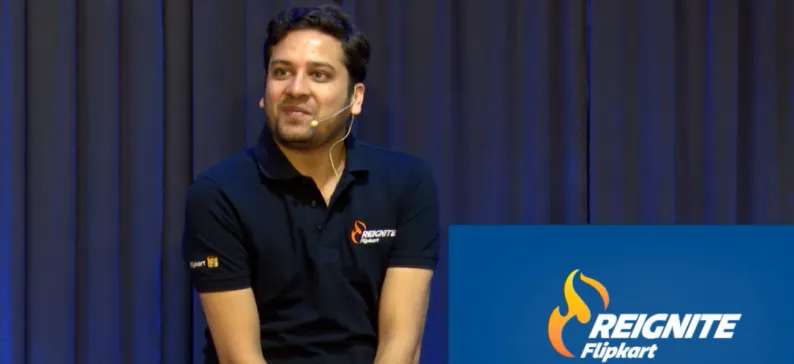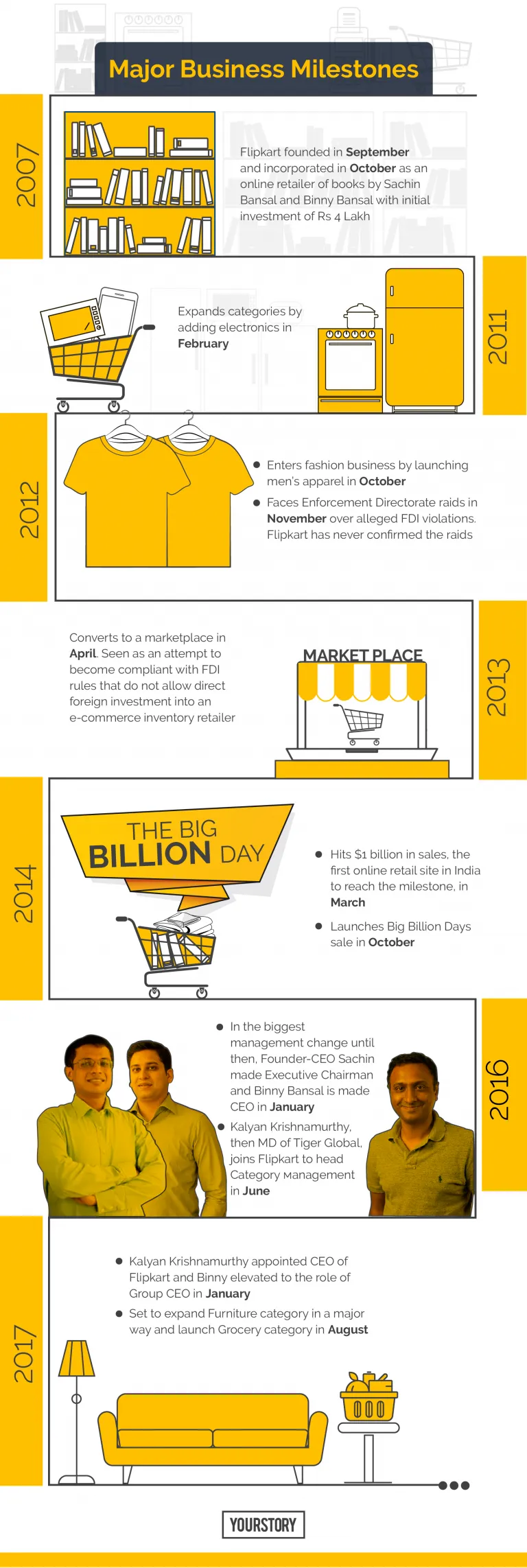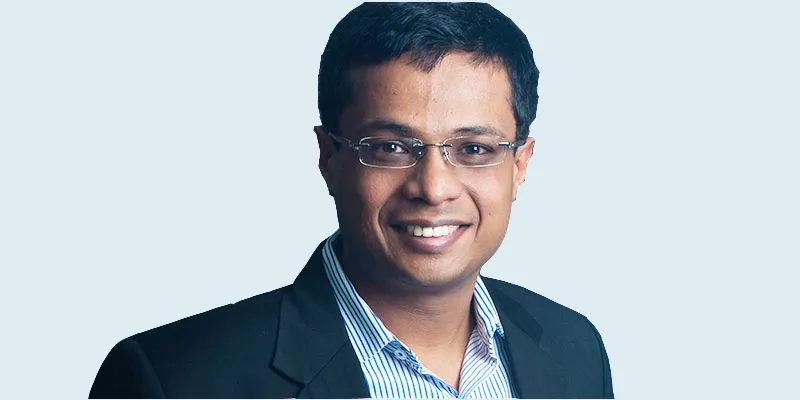[The Big Interview] Sachin Bansal and Binny Bansal on their 10 year journey
The one where the Bansals of Flipkart talk about the big plans while looking back on the decade spent building India’s most valuable startup.
Sachin Bansal and Binny Bansal were in their mid-twenties when they founded Flipkart 10 years ago. In the ensuing decade, a lot has changed for the two. The small online bookstore they launched in 2007 is now India’s largest online retail portal, and also the country’s most valuable startup. This adventurous journey has also made them dollar billionaires. You might love them or hate them, agree or disagree with their strategies, but it is only fair to give them credit for helping build up the Indian e-commerce industry and for making ‘starting up’ a cool and an aspirational career path for many youngsters in India.
To be sure, they have had a long list of hits, but Flipkart’s founders have also had to deal with a whole lot of misses—times when their strategies failed. A series of wrong decisions taken in 2015, primarily the mobile and app-first strategy, saw Sachin exit as CEO and ‘move up’ as Executive Chairman in early 2016. Binny, who was until then the COO, was named his successor, but that didn’t last long. In January 2017, he was made Group CEO, a decision rumoured to have been made by the investors and the Board of Directors because growth milestones had not been met. Long-time Tiger Global executive Kalyan Krishnamurthy, who returned to Flipkart in 2016 to help get the company back on the growth path, now calls the shots as Flipkart’s CEO.
However, these changes do not mean the founders no longer have a say in the business. Far from it. Sachin is reportedly building up Flipkart’s private label portfolio and is overseeing a few long-term tech solutions the company’s product development team is working on. Binny is responsible for group strategy. According to Flipkart insiders, the two take a keen and active interest in what is happening across departments in the company. In an exclusive conversation with YourStory, Sachin and Binny shared their views on Flipkart’s achievements, failures and path ahead. Here are the edited excerpts:
As you look back on the 10-year-old journey of Flipkart, what would you consider as Flipkart's greatest achievements?
Sachin and Binny (Flipkart wanted the responses to be jointly attributed to the two): The past decade has been absolutely fantastic, and the journey truly enriching and humbling. As we celebrate our tenth anniversary this year, I look back and think that for a young, inexperienced company like Flipkart, it was remarkable that we had the audacity to attempt to build an entire ecosystem from scratch. India’s unique market and traditional customer psyche meant global business models couldn’t work here. So, whether it was launching Cash on Delivery on scale—which gave Indian customers the confidence to shop online—or programmes like In-a-Day-Guarantee, No-Cost EMI, and a customer-friendly returns policy, Flipkart’s innovations slowly transformed the way India shops.
Sure, there were ups and downs, but I think history will remember us for two things. To consumers, Flipkart will be remembered as the company that created Indian e-commerce, that brought to the average Indian’s doorstep a wide range of affordable, quality products. The other is Flipkart’s contribution in creating the startup ecosystem in India. Hundreds of startups focussed on solving for India have been inspired by Flipkart to create products that improve people’s lives. Flipkart has instilled confidence in budding entrepreneurs that world-class tech-product companies can be built in India as well. These, I think, are our greatest achievements.

Where has Flipkart failed?
Sachin and Binny: The best answer to this is a quote from Thomas Edison: “I have not failed. I've just found 10,000 ways that won't work.” As a young company, there were several things we did in the past decade that in hindsight may seem a little hasty. But, in reality, they were all critical components of our evolution because we learnt from those experiences and emerged stronger. So, there are no long-term failures at Flipkart. There are only learnings that we pick up from every project or workstream and apply elsewhere.
What will/should Flipkart focus on now?
Sachin and Binny: Since 2007, Flipkart has worked to transform e-commerce in India through technology, improve people’s lives, and there is no change in that core focus. But 10 years ago, Indian customers were reluctant to buy things online, let alone make expensive purchases or pay in advance. Through years of innovation, people have now started coming to Flipkart whenever they need to buy something. So, (we have) our task cut out, really: one, we must ensure customers keep coming to Flipkart and realise the value in shopping online; two, we have to get the next 500 million customers from middle India to join the digital cart and experience the ease, comfort and wide choice of e-commerce. It’s only possible if we have the whole deal in place, from products in most categories to a payments solution that’s easier and more rewarding. The Flipkart Group is pushing the envelope on all these fronts with our upcoming foray into groceries, and with our popular UPI-based payments app, PhonePe.


What are the key areas/strategies that will give Flipkart a competitive advantage in the coming months and years?
Sachin and Binny: What has held us in good stead all these years is what will continue to keep us ahead. And that is the fact that we’re a home-grown, innovative company which understands India better than others. Our work always takes into account the needs of the Indian customer and how his/her tastes are evolving. We’ve reached the scale now where we want to shift gears and ensure a more personalised experience to customers through an expansion in our tech capabilities. We’re bringing greater sophistication in the way we leverage machine learning and artificial intelligence, especially in areas such as customer experience. We’re also working on new innovation constructs that will make shopping at Flipkart even more hassle-free and rewarding.
You have talked about Flipkart expanding the Indian e-commerce market in past interviews. What steps is Flipkart taking to reach the next tens of millions of potential e-commerce customers, whose needs, expectations and requirements will be very different from those who are shopping online now?
Sachin and Binny: It’s true that the next growth engine for us are the smaller towns and villages in India. To get them shopping online entails a few things apart from the basics of the availability of low-priced smartphones and increased mobile internet literacy. It includes having product selections that are relevant to them, which could be different from what customers in cities want. It means having an even wider last-mile reach to ensure quick deliveries and returns, and having consumer finance innovation constructs like No-Cost-EMI that make quality brands accessible. Indian customers trust Flipkart to make this happen, and we’re making good progress on each of these fronts.

When do you think Flipkart will stop being dependent on external capital? What are the steps you are taking now to ensure Flipkart gets less dependent on risk capital?
Sachin and Binny: Flipkart is well capitalised for the foreseeable future. Our existing business lines that have been around for some time generate their own cash flows and are not dependent on the company for running their day-to-day operations. So, we’re investing new money on growth verticals such as groceries and fintech. We’ve also innovated to realise efficiencies of scale in our marketplace business, logistics and other parts, all of which has ensured our requirement for new capital across the organisation steadily comes down.
What do you think Flipkart and Indian e-commerce will look like 10 years from now? What are your hopes and goals?
Sachin and Binny: E-commerce in India has immense potential because India is only just about getting online in the true sense. Only 2 percent of all retail in India is currently online and even within that small space, we’ve only scratched the surface so far. Flipkart is still a young company and while we have achieved a substantial bit, there is so much more to do to bring 500 million Indians online in the next 10 years. I’m hopeful that if we keep our eye on the ball, e-commerce will be part of people’s daily lives, even in the remotest corners of India, by 2027. Technology will play a huge role in getting there and helping to remove some of the disparities that exist in society now, because then everyone would have access to the same products and services, irrespective of location.


![[The Big Interview] Sachin Bansal and Binny Bansal on their 10 year journey](https://images.yourstory.com/cs/wordpress/2018/01/bg_chapter3-e1515691588242.jpg?mode=crop&crop=faces&ar=16%3A9&format=auto&w=1920&q=75)




